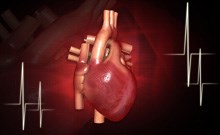
Top stories






LifestyleWhen to stop Googling and call the vet: Expert advice on pet allergies from dotsure.co.za
dotsure.co.za 16 Feb 2026
More news


Marketing & Media
Ads are coming to AI. Does that really have to be such a bad thing?














The painkillers are known as nonsteroidal anti-inflammatory drugs (NSAIDs), and include overthe-counter drugs such as ibuprofen and naproxen, as well as prescription drugs such as Celebrex (celecoxib), the researchers say.
"These results support previous findings that NSAIDs have no apparent safe treatment window among patients with a (prior) heart attack," says lead researcher Dr Anne-Marie Schjerning Olsen, from the department of cardiology at the University of Copenhagen.
"Long-term caution with use of NSAIDs is advised in all patients after a heart attack," she says.
Olsen says that "it is important to get the message out to clinicians taking care of patients with cardiovascular disease that NSAIDs are harmful, even several years after a heart attack".
The report of her study is published in a recent issue of Circulation. For the study, researchers collected data on almost 100,000 people who had experienced a heart attack between 1997 and 2009. They found that 44% of these patients had filled at least one prescription for an NSAID.
Compared to non-users, people who took the painkillers had a 59% higher risk of dying from any cause within a year after their heart attack, and a 63% higher risk within five years, the researchers found.
In addition, the risk of having another heart attack or dying from heart disease increased 30% within one year, and 41% after five years, the Danish team says.
These findings were the same for men and women regardless of age and income, the researchers found, and the study also accounted for factors such as other illnesses or medications.
Still, the data comes from what's known as an observational study, so it cannot prove that NSAIDs helped cause the deaths and heart attacks - only that there is an association. Nevertheless, the use of these drugs should be limited and the ability to buy them over the counter should be reconsidered, the researchers say.
"It has been shown in multiple prior studies that regular use of NSAIDs, including those that are available over the counter, is associated with increased risk of cardiovascular events," says Dr Gregg Fonarow, a spokesman for the American Heart Association and a professor of cardiology at the University of California, who was not involved with the study.
"Even short-term use in patients after a heart attack or with heart failure has been associated with excess risk," he says.
Since 2007, American Heart Association guidelines have warned of the potential cardiovascular risk of NSAIDs in patients with established cardiovascular disease and after a heart attack, and discouraged their use in these patients, Fonarow says.
"This study highlights that substantial caution is necessary when considering NSAIDs in patients after a heart attack no matter how long ago the heart attack occurred," he says.
"Patients with a history (of heart attack) should consult with their physicians before taking NSAIDs, including those that are available over the counter."
After a heart attack, patients are usually prescribed aspirin, which is also an NSAID.
However, "these findings do not apply to aspirin, which is a protective therapy after a heart attack", Fonarow says.
People who took the painkillers had a 59% higher risk of dying within a year after their heart attack.
Source: Business Day via I-NET Bridge

For more than two decades, I-Net Bridge has been one of South Africa’s preferred electronic providers of innovative solutions, data of the highest calibre, reliable platforms and excellent supporting systems. Our products include workstations, web applications and data feeds packaged with in-depth news and powerful analytical tools empowering clients to make meaningful decisions.
We pride ourselves on our wide variety of in-house skills, encompassing multiple platforms and applications. These skills enable us to not only function as a first class facility, but also design, implement and support all our client needs at a level that confirms I-Net Bridge a leader in its field.
Go to: http://www.inet.co.za